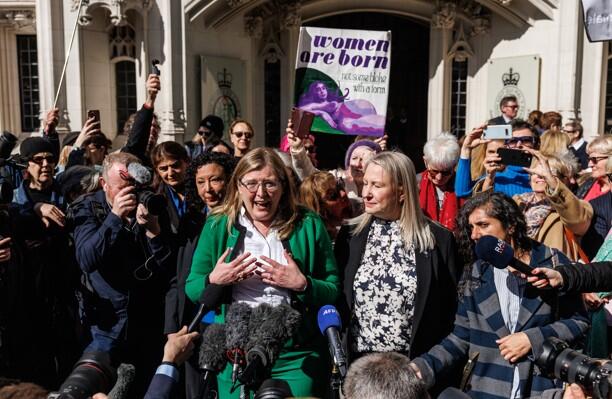
London — In a potential landmark decision, the U.K. Supreme Court ruled Wednesday that in a 2010 civil rights law called the Equality Act, the word “woman” refers to someone’s biological sex.
The five judges on the court stressed that their ruling was limited to interpreting the 2010 law as it pertains to women, and that “it is not the role of the court to adjudicate on the arguments in the public domain on the meaning of gender or sex, nor is it to define the meaning of the word ‘woman’ other than when it is used in the provisions of” that legislation.
What the U.K. Supreme Court said about the definition of “woman”
Monday’s ruling was in response to a series of challenges brought by the campaign group For Women Scotland (FWS). The group initially challenged the definition of the term “woman” as included in Scottish legislation from 2018, which set targets to increase the proportion of women serving on public bodies.
That legislation, for its own purposes, initially defined the term “woman” as including people “(i) with the protected characteristic of gender reassignment; (ii) living as a woman; and (iii) proposing to undergo / undergoing / who have undergone a gender reassignment process,” Monday’s Supreme Court judgement said.
Dan Kitwood/Getty
FWS challenged that definition and subsequent statutory guidance was issued amending the definition of a “woman” under the Scottish law to bring it in line with the U.K.-wide Equality Act of 2010, which included people with Gender Recognition Certificates. Those government-issued GRCs allow a person’s affirmed gender to be legally recognized in the U.K.
That further guidance was appealed by FWS, however, and the case eventually made it to the Supreme Court, which ruled Wednesday that “the terms woman and sex in the Equality Act 2010 refer to a biological woman and biological sex,” though the court stressed that the definition was solely for the purpose of interpreting the specific part of the legislation in question.
“The questions raised by this appeal directly affect women and members of the trans community,” the Supreme Court said. “On the one hand, women have historically suffered from discrimination in our society and since 1975 have been given statutory protection against discrimination on the ground of sex. On the other hand, the trans community is both historically and currently a vulnerable community which Parliament has more recently sought to protect by statutory provision.”
“It is not the role of the court to adjudicate on the arguments in the public domain on the meaning of gender or sex, nor is it to define the meaning of the word ‘woman’ other than when it is used in the provisions of the EA 2010,” the judges said.
The Supreme Court said using a wider definition of “woman” under the Equality Act could have created confusion among those trying to use the law to protect women and trans people from discrimination.
“Gender reassignment and sex are separate bases for discrimination and inequality,” the judgement said.
It explained that in the court’s view, including trans people with a GRC certificate under the category of “woman,” for the purposes of interpreting the Equality Act, “would create two sub-groups within those who share the protected characteristic of gender reassignment, giving trans persons who possess a GRC greater rights than those who do not. Those seeking to perform their obligations under the Act would have no obvious means of distinguishing between the two sub-groups to whom different duties were owed.”
Responses to the U.K. Supreme Court’s judgement
The ruling by the U.K. Supreme Court comes at the same time as efforts by the Trump administration in the United States to to prohibit gender-affirming care for minors and bar trans people from serving in the U.S. military or participating in women’s sports.
Activist Grahame Park Girl told Britain’s Press Association news service on Monday that the court’s judgement was “the only common sense decision you can make. Anything else would be farcical and appalling for women’s rights.”
J.K. Rowling, who has campaigned for the primacy of biological sex, celebrated the judgement on social media.
“It took three extraordinary, tenacious Scottish women with an army behind them to get this case heard by the Supreme Court and, in winning, they’ve protected the rights of women and girls across the U.K.,” Rowling said.
LGBTQ+ rights group Stonewall said it would work with partners to understand the implications of Monday’s ruling for trans people, and cautioned against anyone attempting to interpret it too broadly.
“Stonewall shares the deep concern at the widespread implications for today’s ruling from the Supreme Court. It will be incredibly worrying for the trans community and all of us who support them,” Stonewall CEO Simon Blake said in a statement.
“It’s important to be reminded the Court strongly and clearly re-affirmed the Equality Act protects all trans people against discrimination, based on Gender Reassignment, and will continue to do so,” Blake said.
“We are really shocked by today’s Supreme Court decision — which reverses twenty years of understanding on how the law recognizes trans men and women with Gender Recognition Certificates,” the rights group Scottish Trans said in a statement. “The judgement seems to have totally missed what matters to trans people — that we are able to live our lives, and be recognized, in line with who we truly are.”




